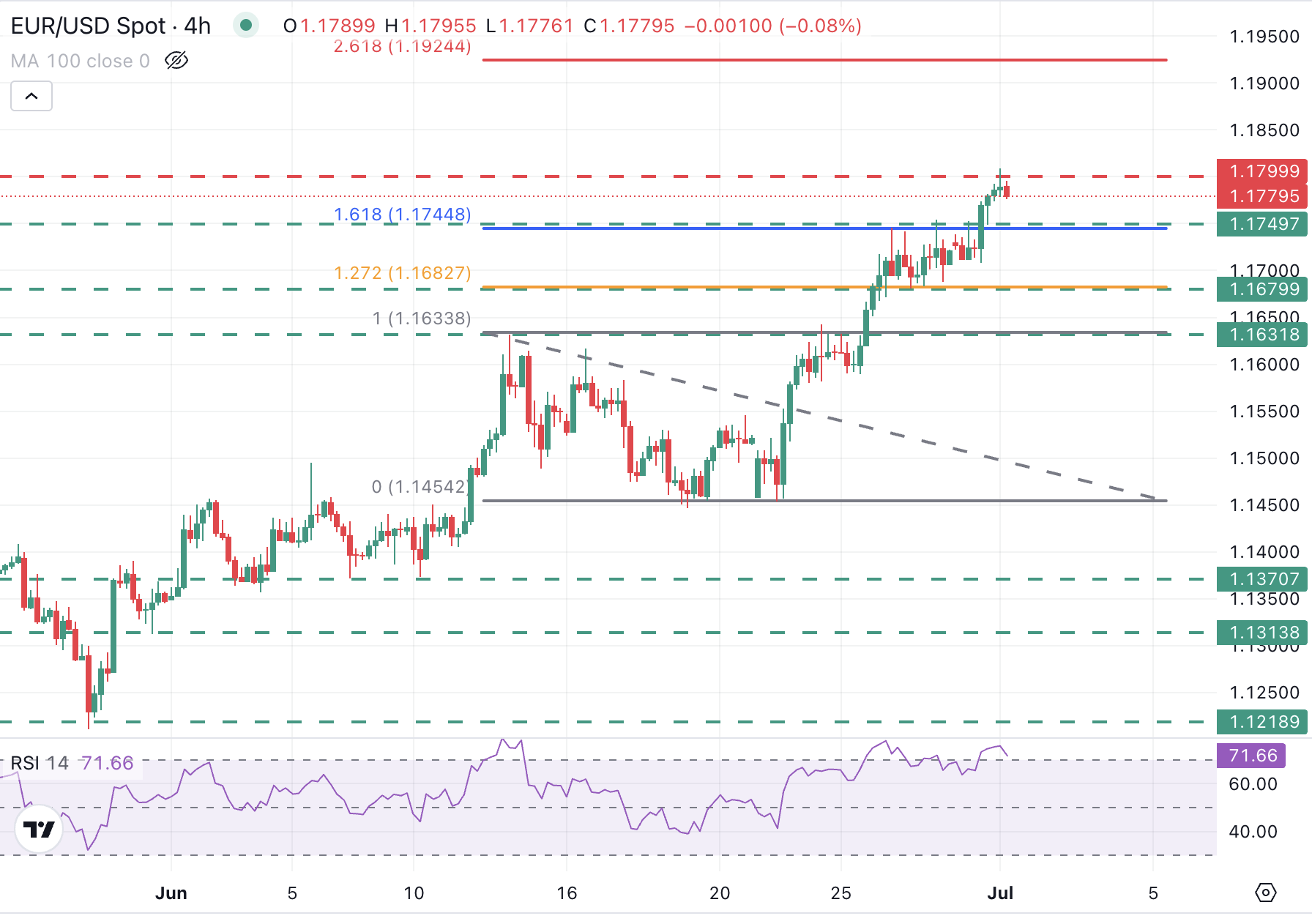Created
: 2025.07.01














![]() 2025.07.01 17:12
2025.07.01 17:12
The EUR/USD pair is trading practically flat around 1.1790 at the moment of writing on Tuesday, edging slightly down after a nine-day rally that reached levels above 1.1800 for the first time in almost four years.
The Greenback remains on the defensive, hit by a mix of concerns about the chaotic US trade policy, mounting fears about the country's fiscal debt, and rising expectations that the Federal Reserve (Fed) will cut interest rates at least twice before the end of the year.
In the trade domain, optimism about Monday's rare earths deal between the US and China has been offset by US President Donald Trump's complaints about the discussions with Japan and US Treasury Secretary Scott Bessent's threats of higher tariffs.
Moreover, uncertainty about Trump's sweeping tax bill, which is struggling to make its way through the Senate, amid divisions within the republican party about its impact on the US fiscal debt, is adding pressure on the US Dollar.
Another source of pressure for the US Dollar is monetary policy. The president's continuous pressure on the Fed Chairman Jerome Powell to cut interest rates and the softer US data recently released have prompted investors to ramp up rate cut bets for the second half of the year.
The table below shows the percentage change of Euro (EUR) against listed major currencies today. Euro was the strongest against the Australian Dollar.
| USD | EUR | GBP | JPY | CAD | AUD | NZD | CHF | |
|---|---|---|---|---|---|---|---|---|
| USD | 0.09% | -0.06% | -0.26% | 0.00% | 0.06% | -0.06% | -0.10% | |
| EUR | -0.09% | -0.14% | -0.42% | -0.07% | 0.06% | -0.16% | -0.17% | |
| GBP | 0.06% | 0.14% | -0.18% | 0.10% | 0.20% | -0.02% | -0.03% | |
| JPY | 0.26% | 0.42% | 0.18% | 0.33% | 0.32% | 0.18% | 0.18% | |
| CAD | -0.00% | 0.07% | -0.10% | -0.33% | 0.03% | -0.12% | -0.13% | |
| AUD | -0.06% | -0.06% | -0.20% | -0.32% | -0.03% | -0.22% | -0.24% | |
| NZD | 0.06% | 0.16% | 0.02% | -0.18% | 0.12% | 0.22% | -0.02% | |
| CHF | 0.10% | 0.17% | 0.03% | -0.18% | 0.13% | 0.24% | 0.02% |
The heat map shows percentage changes of major currencies against each other. The base currency is picked from the left column, while the quote currency is picked from the top row. For example, if you pick the Euro from the left column and move along the horizontal line to the US Dollar, the percentage change displayed in the box will represent EUR (base)/USD (quote).

EUR/USD trades slightly down, with the 4-hour Relative Strength Index (RSI 14) showing overbought levels as the pair hits the 1.1800 area. This is often a sign of an upcoming corrective reaction.
On the downside, the previous high at 1.1750 (June 26 and 27 highs), is likely to provide some support to a stronger bearish reaction, ahead of the June 27 low at 1.1680
Resistance is at the mentioned 1.1800 intraday high. Beyond there, the 261.8% Fibonacci extension level of the June 12-23 pullback is at 1.1925.
The Euro is the currency for the 19 European Union countries that belong to the Eurozone. It is the second most heavily traded currency in the world behind the US Dollar. In 2022, it accounted for 31% of all foreign exchange transactions, with an average daily turnover of over $2.2 trillion a day. EUR/USD is the most heavily traded currency pair in the world, accounting for an estimated 30% off all transactions, followed by EUR/JPY (4%), EUR/GBP (3%) and EUR/AUD (2%).
The European Central Bank (ECB) in Frankfurt, Germany, is the reserve bank for the Eurozone. The ECB sets interest rates and manages monetary policy. The ECB's primary mandate is to maintain price stability, which means either controlling inflation or stimulating growth. Its primary tool is the raising or lowering of interest rates. Relatively high interest rates - or the expectation of higher rates - will usually benefit the Euro and vice versa. The ECB Governing Council makes monetary policy decisions at meetings held eight times a year. Decisions are made by heads of the Eurozone national banks and six permanent members, including the President of the ECB, Christine Lagarde.
Eurozone inflation data, measured by the Harmonized Index of Consumer Prices (HICP), is an important econometric for the Euro. If inflation rises more than expected, especially if above the ECB's 2% target, it obliges the ECB to raise interest rates to bring it back under control. Relatively high interest rates compared to its counterparts will usually benefit the Euro, as it makes the region more attractive as a place for global investors to park their money.
Data releases gauge the health of the economy and can impact on the Euro. Indicators such as GDP, Manufacturing and Services PMIs, employment, and consumer sentiment surveys can all influence the direction of the single currency. A strong economy is good for the Euro. Not only does it attract more foreign investment but it may encourage the ECB to put up interest rates, which will directly strengthen the Euro. Otherwise, if economic data is weak, the Euro is likely to fall. Economic data for the four largest economies in the euro area (Germany, France, Italy and Spain) are especially significant, as they account for 75% of the Eurozone's economy.
Another significant data release for the Euro is the Trade Balance. This indicator measures the difference between what a country earns from its exports and what it spends on imports over a given period. If a country produces highly sought after exports then its currency will gain in value purely from the extra demand created from foreign buyers seeking to purchase these goods. Therefore, a positive net Trade Balance strengthens a currency and vice versa for a negative balance.
![]()
Created
: 2025.07.01
![]()
Last updated
: 2025.07.01

FXStreet is a forex information website, delivering market analysis and news articles 24/7.
It features a number of articles contributed by well-known analysts, in addition to the ones by its editorial team.
Founded in 2000 by Francesc Riverola, a Spanish economist, it has grown to become a world-renowned information website.
We hope you find this article useful. Any comments or suggestions will be greatly appreciated.
We are also looking for writers with extensive experience in forex and crypto to join us.
please contact us at [email protected].
Disclaimer:
All information and content provided on this website is provided for informational purposes only and is not intended to solicit any investment. Although all efforts are made in order to ensure that the information is correct, no guarantee is provided for the accuracy of any content on this website. Any decision made shall be the responsibility of the investor and Myforex does not take any responsibility whatsoever regarding the use of any information provided herein.
The content provided on this website belongs to Myforex and, where stated, the relevant licensors. All rights are reserved by Myforex and the relevant licensors, and no content of this website, whether in full or in part, shall be copied or displayed elsewhere without the explicit written permission of the relevant copyright holder. If you wish to use any part of the content provided on this website, please ensure that you contact Myforex.
Myforex uses cookies to improve the convenience and functionality of this website. This website may include cookies not only by us but also by third parties (advertisers, log analysts, etc.) for the purpose of tracking the activities of users. Cookie policy